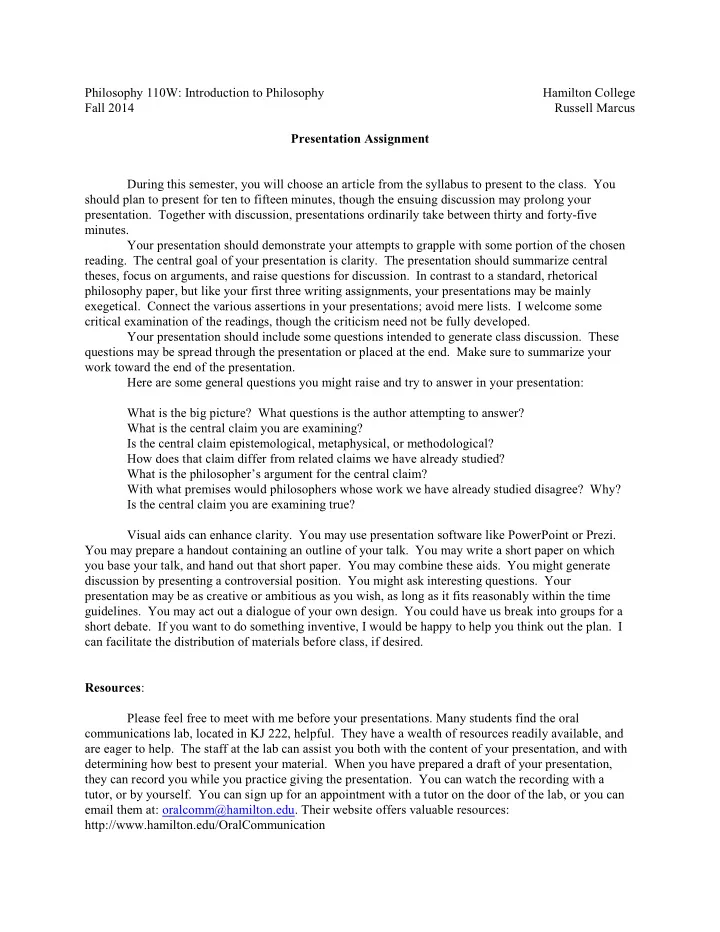

Philosophy 110W: Introduction to Philosophy Hamilton College Fall 2014 Russell Marcus Presentation Assignment During this semester, you will choose an article from the syllabus to present to the class. You should plan to present for ten to fifteen minutes, though the ensuing discussion may prolong your presentation. Together with discussion, presentations ordinarily take between thirty and forty-five minutes. Your presentation should demonstrate your attempts to grapple with some portion of the chosen reading. The central goal of your presentation is clarity. The presentation should summarize central theses, focus on arguments, and raise questions for discussion. In contrast to a standard, rhetorical philosophy paper, but like your first three writing assignments, your presentations may be mainly exegetical. Connect the various assertions in your presentations; avoid mere lists. I welcome some critical examination of the readings, though the criticism need not be fully developed. Your presentation should include some questions intended to generate class discussion. These questions may be spread through the presentation or placed at the end. Make sure to summarize your work toward the end of the presentation. Here are some general questions you might raise and try to answer in your presentation: What is the big picture? What questions is the author attempting to answer? What is the central claim you are examining? Is the central claim epistemological, metaphysical, or methodological? How does that claim differ from related claims we have already studied? What is the philosopher’s argument for the central claim? With what premises would philosophers whose work we have already studied disagree? Why? Is the central claim you are examining true? Visual aids can enhance clarity. You may use presentation software like PowerPoint or Prezi. You may prepare a handout containing an outline of your talk. You may write a short paper on which you base your talk, and hand out that short paper. You may combine these aids. You might generate discussion by presenting a controversial position. You might ask interesting questions. Your presentation may be as creative or ambitious as you wish, as long as it fits reasonably within the time guidelines. You may act out a dialogue of your own design. You could have us break into groups for a short debate. If you want to do something inventive, I would be happy to help you think out the plan. I can facilitate the distribution of materials before class, if desired. Resources : Please feel free to meet with me before your presentations. Many students find the oral communications lab, located in KJ 222, helpful. They have a wealth of resources readily available, and are eager to help. The staff at the lab can assist you both with the content of your presentation, and with determining how best to present your material. When you have prepared a draft of your presentation, they can record you while you practice giving the presentation. You can watch the recording with a tutor, or by yourself. You can sign up for an appointment with a tutor on the door of the lab, or you can email them at: oralcomm@hamilton.edu. Their website offers valuable resources: http://www.hamilton.edu/OralCommunication
Sign-ups We will sign up for presentations, by email, after the second day of class. Please send me at least three desired slots, in order of preference. The topics are listed below and may be correlated with dates by looking at the syllabus. Newton, from Principia Leibniz, from Letters to Clarke Zimmerman, “The Privileged Present: Defending an “A-Theory” of Time Smart, “The Space-Time World” Noonan, “Abortion is Morally Wrong” Warren, “The Personhood Argument in Favor of Abortion” Plato, from Phaedo Locke, “The Prince and the Cobbler” Reid, “Of Mr. Locke’s Account of Our Personal Identity” Reid, “Of Identity” Hume, “The Self” Parfit, “Divided Minds and the Nature of Persons” Descartes, “On the Nature of Mind” Arnauld and Descartes on the Mind Skinner, from Science and Human Behavior Hempel, “The Logical Analysis of Psychology” Armstrong, “The Nature of Mind” Fodor, “The Mind-Body Problem” Jackson, “Epiphenomenal Qualia” Plato, “Why Should I Be Moral” Mill, from Utilitarianism Kant, from Groundwork of the Metaphysic of Morals
Presentation Sign-Up List Date Topics Presenters Names September 23 1. Newton, from Principia 1. 2. Leibniz, from Letters to Clarke 2. September 25 Zimmerman, “The Privileged Present: Defending an “A-Theory” of Time September 30 Smart, “The Space-Time World” October 2 1. Noonan, “Abortion is Morally 1. Wrong” 2. Warren, “The Personhood Argument 2. in Favor of Abortion October 9 Plato, from Phaedo October 14 1. Locke, “The Prince and the Cobbler” 1. 2. Reid, “Of Mr. Locke’s Account of 2. Our Personal Identity” October 21 1. Reid, “Of Identity” October 23 1. Hume, “The Self” 1. 2. Parfit, “Divided Minds and the 2. Nature of Persons” November 4 1. Descartes, “On the Nature of Mind” 1. 2. Arnauld and Descartes, On the Mind 2. November 6 1. Skinner, from Science and Human 1. Behavior 2. Hempel, “The Logical Analysis of 2. Psychology”
Date Topics Presenters Names November 11 Armstrong, “The Nature of Mind” November 13 Fodor, “The Mind-Body Problem” November 18 Jackson, “Epiphenomenal Qualia” December 2 Plato, “Why Should I Be Moral” December 4 Mill, from Utilitarianism December 9 Kant, from Groundwork of the Metaphysic of Morals
Recommend
More recommend